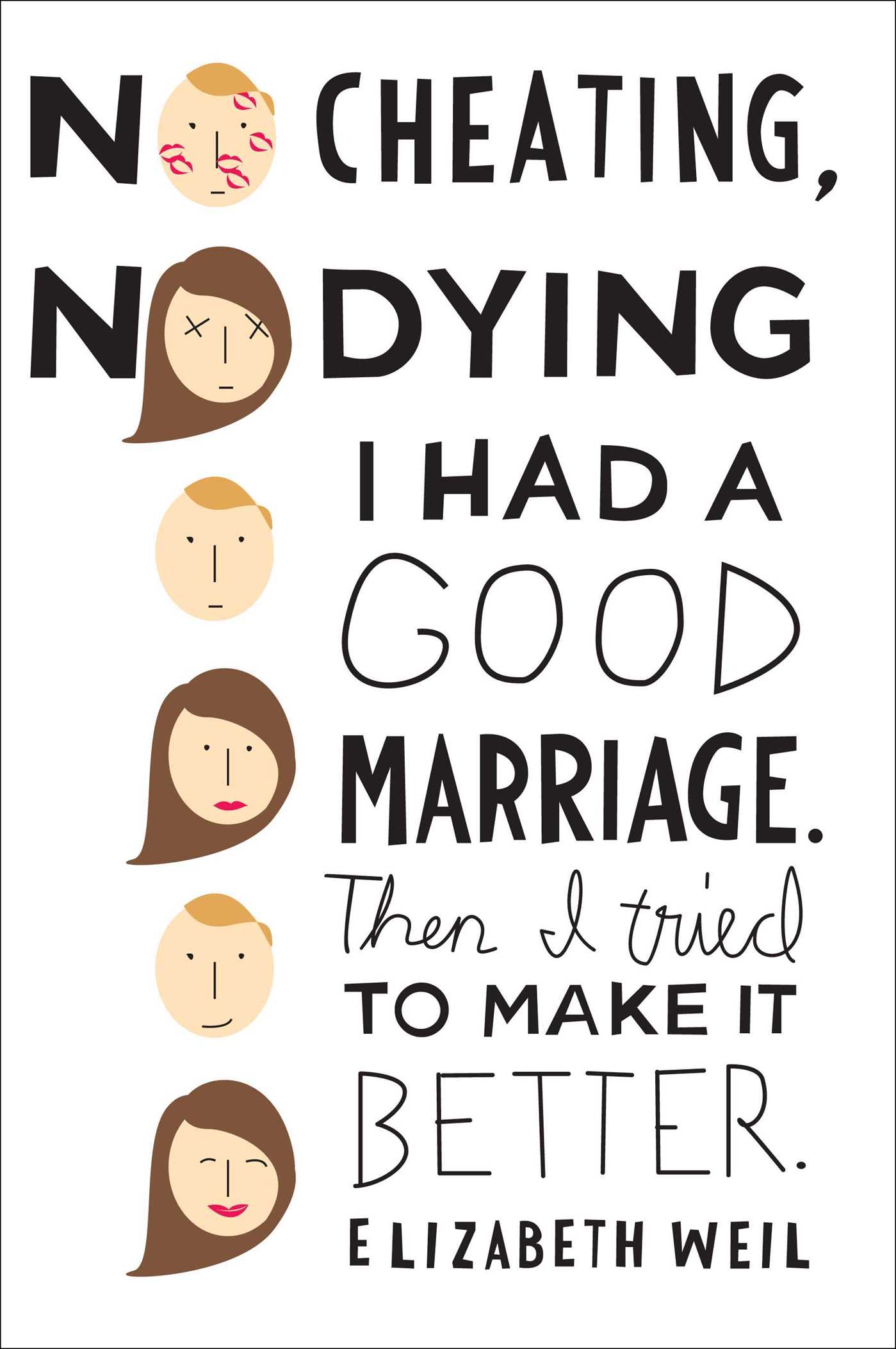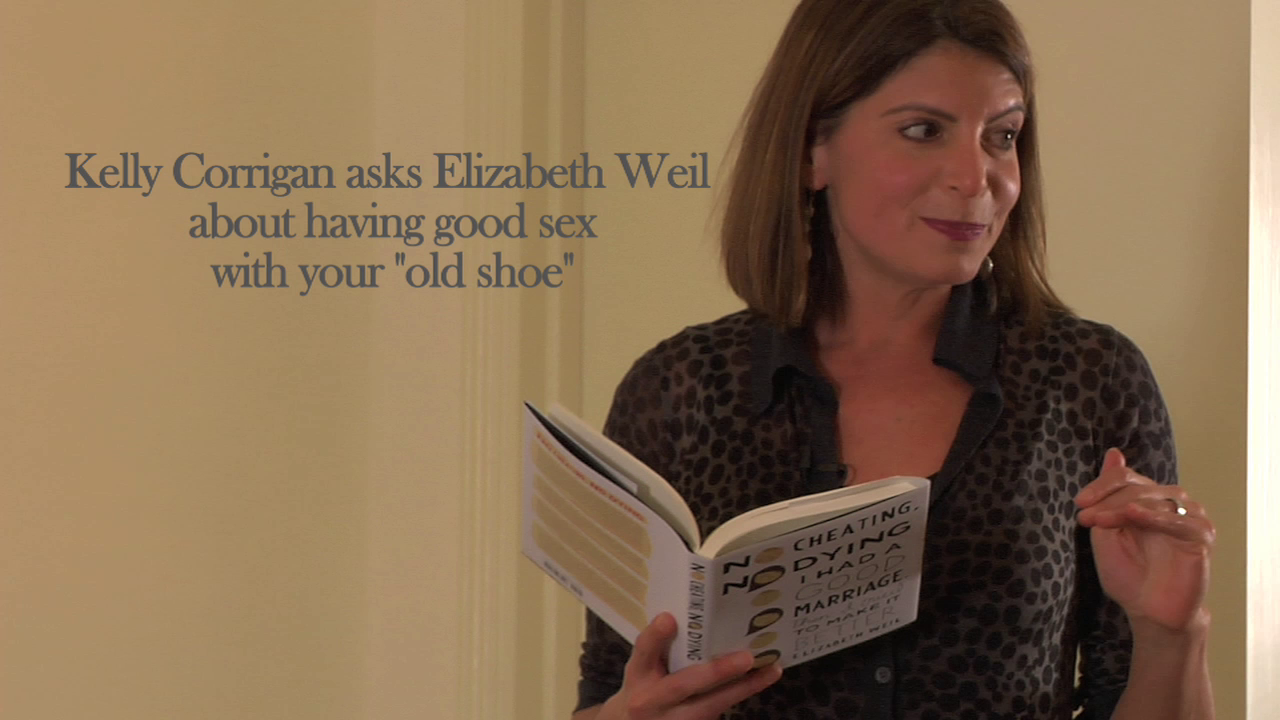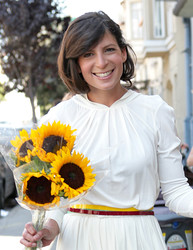Plus, receive recommendations and exclusive offers on all of your favorite books and authors from Simon & Schuster.
Table of Contents
About The Book
Written with charm and wit, No Cheating, No Dying investigates one of the most universal human institutions—marriage. Elizabeth Weil and her husband Dan have two basic ground rules for their marriage: no cheating, no dying. For ten years it’s worked fine, but Elizabeth started to wonder if it could be better.
Elizabeth Weil believes that you don’t get married in a white dress, in front of all your future in-laws and ex-boyfriends but gradually, over time, through all the road rage incidents and pre-colonoscopy enemas, good and bad dinners, and all the small moments you never expected to happen or much less endure. In this book, Weil examines the major universal marriage issues—sex, money, mental health, in-laws, children—through bravely recounting her own hilarious, messy, and sometimes difficult relationship. She seeks out the advice of financial planners, psychoanalysts, therapists, household management consultants, priests, rabbis, and the United States government. Woven into this funny and forthright narrative is Weil's extensive research on marriage and marriage improvement. The result is an illuminating and entertaining read that is a fresh addition to the body of literature about marriage.
Elizabeth Weil believes that you don’t get married in a white dress, in front of all your future in-laws and ex-boyfriends but gradually, over time, through all the road rage incidents and pre-colonoscopy enemas, good and bad dinners, and all the small moments you never expected to happen or much less endure. In this book, Weil examines the major universal marriage issues—sex, money, mental health, in-laws, children—through bravely recounting her own hilarious, messy, and sometimes difficult relationship. She seeks out the advice of financial planners, psychoanalysts, therapists, household management consultants, priests, rabbis, and the United States government. Woven into this funny and forthright narrative is Weil's extensive research on marriage and marriage improvement. The result is an illuminating and entertaining read that is a fresh addition to the body of literature about marriage.
Reading Group Guide
Get a FREE ebook by joining our mailing list today! Plus, receive recommendations for your next Book Club read.
By clicking 'Sign me up' I agree to the Terms of Use and acknowledge the Privacy Policy and Notice of Financial Incentive. Free ebook offer available to NEW US subscribers only. Offer redeemable at Simon & Schuster's ebook fulfillment partner. Must redeem within 90 days. See full terms and conditions and this month's choices.
This reading group guide for No Cheating, No Dying includes an introduction, discussion questions, and ideas for enhancing your book club. The suggested questions are intended to help your reading group find new and interesting angles and topics for your discussion. We hope that these ideas will enrich your conversation and increase your enjoyment of the book.
Introduction
Elizabeth Weil and her husband, Dan Duane, had two ground rules for their marriage: no cheating, no dying. This mantra worked well for a decade, until Elizabeth decided to up the ante. Part memoir and part savvy self-help guide, No Cheating, No Dying is a forthright, funny book about a happy marriage and the therapies, exercises, and attitudes that might make it even better…or not.
Topics & Questions for Discussion
1. Elizabeth Weil begins No Cheating, No Dying by stating that she “had a good marriage.” (p. 1) Why then does she set out to improve it? What were your initial thoughts about this endeavor?
2. Elizabeth admits the marriage improvement project made her relationship with Dan “truly better,” although not in the ways she expected. (p. 1) What are her expectations going into this experiment? What turns out differently than she anticipated?
3. What is your overall opinion of Elizabeth and Dan as a couple? What about each one individually? What are the major strengths and weaknesses in their relationship? Do you think Elizabeth presents an honest portrait of their marriage? Why or why not?
4. In what ways does the marriage improvement project strain Elizabeth and Dan’s relationship? How much of a risk did they take by doing this? What do you think would happen if you tried this in your own life?
5. Following their unsuccessful pregnancy, Elizabeth writes feeling as if she had “disintegrated,” while Dan responds by frantically retrofitting their house for “the Big One.” How do they find their way back to one another? In your own life, how do you deal with tragedy? Do you think a tragedy would pull you closer to your partner or push you away?
6. In No Cheating, No Dying, Elizabeth dives into the common struggles of marriage—sex, finances, in-laws, and parenting? How do these things impact your own marriage? Are your struggles similar to or different from theirs? Elizabeth and Dan also have to work through some more unique factors, like both working from home and integrating two different religions. What are the unique factors in your own relationship? How do you deal with them?
7. Discuss the various professionals Elizabeth and Dan consult. Of all the advice they receive, what do you think was most helpful improving and strengthening their relationship? What advice do you think would have been most helpful to you? On the flip side, what do you think was the worst advice Elizabeth and Dan given?
8. Why is Elizabeth so swayed by her conversation with Rabbi Kushner? What do you think of Dan’s reaction to Elizabeth’s request that they eliminate Christian traditions from their daughters’ lives. Do you agree with Elizabeth that she “crossed an important line” (p. 111) by even making the suggestion?
9. Why is the “Napa disagreement” such a major source of conflict for Elizabeth and Dan? What larger issues does it reveal? Whose viewpoint do you agree with more? Have you ever experienced a similar roadblock in a relationship? How were you able to move past it?
10. Elizabeth points out that Dan’s cooking might sound like a fantasy to some women. Why does it become a point of contention in their marriage? Do you think it would in yours? How do you or your partner deal with hobbies that veer into obsessions?
11. “For two couples so demographically similar—all four of our parents are white, college educated, middle class, and born between 1936 and 1942…our folks set very different examples of how a marriage could be good.” (p. 15) In what ways have Elizabeth and Dan’s upbringings and perceptions of their parents’ relationships influenced their own marriage? Reflect on your own upbringing. What have you learned from your parents’ relationship?
12. Discuss Elizabeth’s decision to break off her friendship with Monique at Dan’s behest. Is this a fair thing to ask a spouse to do? Why or why not? What sacrifices have your made for your relationship? Consider the decisions you made early on: would you make the same choices again?
13. Ultimately, do Elizabeth and Dan’s efforts improve their relationship? How so? Would you ever consider undertaking your own marriage or relationship improvement plan? Why or why not?
14. What inspired you or your book club to read No Cheating, No Dying? What are your overall thoughts about the book? What are you eager to discuss with your book club?
Enhance Your Book Club
1. Pair your reading of No Cheating, No Dying with one of Elizabeth’s favorite books about marriage, The Year of Magical Thinking by Joan Didion or About Alice by Calvin Trillin. Discuss the relationships in these memoirs and how they are portrayed. How do these authors describe their partners?
2. “The most effective seventy-three seconds I dedicated to improving my marriage were those I spent watching a web video by Nick Sanabria called Third Race at the Honeymoon Is Over Downs,” writes Elizabeth. “I loved this—totally loved it, which was surprising, even instructive, given that until I’d watched the video, one of the things I’d been most reluctant to change about my marriage was my delusion that is was entirely unique.” Watch the video online and discuss your reactions.
3. Listen to a radio interview with Elizabeth Weil and her husband, Dan, at: www.kqed.org/a/forum/R912080900with. What is it like to hear Dan’s perspective?
4. Visit www.elizabethweil.net to read some of Elizabeth’s articles, including one that appeared in Vogue magazine about her open-water Alcatraz swim.
5. Take a culinary cue from Dan and for your next book club meeting serve up some dishes from Chez Panisse Vegetables or another of Alice Waters’ culinary tomes listed on page 98. Or, go for one of Elizabeth’s “ultimate fantasies”—takeout sushi.
Introduction
Elizabeth Weil and her husband, Dan Duane, had two ground rules for their marriage: no cheating, no dying. This mantra worked well for a decade, until Elizabeth decided to up the ante. Part memoir and part savvy self-help guide, No Cheating, No Dying is a forthright, funny book about a happy marriage and the therapies, exercises, and attitudes that might make it even better…or not.
Topics & Questions for Discussion
1. Elizabeth Weil begins No Cheating, No Dying by stating that she “had a good marriage.” (p. 1) Why then does she set out to improve it? What were your initial thoughts about this endeavor?
2. Elizabeth admits the marriage improvement project made her relationship with Dan “truly better,” although not in the ways she expected. (p. 1) What are her expectations going into this experiment? What turns out differently than she anticipated?
3. What is your overall opinion of Elizabeth and Dan as a couple? What about each one individually? What are the major strengths and weaknesses in their relationship? Do you think Elizabeth presents an honest portrait of their marriage? Why or why not?
4. In what ways does the marriage improvement project strain Elizabeth and Dan’s relationship? How much of a risk did they take by doing this? What do you think would happen if you tried this in your own life?
5. Following their unsuccessful pregnancy, Elizabeth writes feeling as if she had “disintegrated,” while Dan responds by frantically retrofitting their house for “the Big One.” How do they find their way back to one another? In your own life, how do you deal with tragedy? Do you think a tragedy would pull you closer to your partner or push you away?
6. In No Cheating, No Dying, Elizabeth dives into the common struggles of marriage—sex, finances, in-laws, and parenting? How do these things impact your own marriage? Are your struggles similar to or different from theirs? Elizabeth and Dan also have to work through some more unique factors, like both working from home and integrating two different religions. What are the unique factors in your own relationship? How do you deal with them?
7. Discuss the various professionals Elizabeth and Dan consult. Of all the advice they receive, what do you think was most helpful improving and strengthening their relationship? What advice do you think would have been most helpful to you? On the flip side, what do you think was the worst advice Elizabeth and Dan given?
8. Why is Elizabeth so swayed by her conversation with Rabbi Kushner? What do you think of Dan’s reaction to Elizabeth’s request that they eliminate Christian traditions from their daughters’ lives. Do you agree with Elizabeth that she “crossed an important line” (p. 111) by even making the suggestion?
9. Why is the “Napa disagreement” such a major source of conflict for Elizabeth and Dan? What larger issues does it reveal? Whose viewpoint do you agree with more? Have you ever experienced a similar roadblock in a relationship? How were you able to move past it?
10. Elizabeth points out that Dan’s cooking might sound like a fantasy to some women. Why does it become a point of contention in their marriage? Do you think it would in yours? How do you or your partner deal with hobbies that veer into obsessions?
11. “For two couples so demographically similar—all four of our parents are white, college educated, middle class, and born between 1936 and 1942…our folks set very different examples of how a marriage could be good.” (p. 15) In what ways have Elizabeth and Dan’s upbringings and perceptions of their parents’ relationships influenced their own marriage? Reflect on your own upbringing. What have you learned from your parents’ relationship?
12. Discuss Elizabeth’s decision to break off her friendship with Monique at Dan’s behest. Is this a fair thing to ask a spouse to do? Why or why not? What sacrifices have your made for your relationship? Consider the decisions you made early on: would you make the same choices again?
13. Ultimately, do Elizabeth and Dan’s efforts improve their relationship? How so? Would you ever consider undertaking your own marriage or relationship improvement plan? Why or why not?
14. What inspired you or your book club to read No Cheating, No Dying? What are your overall thoughts about the book? What are you eager to discuss with your book club?
Enhance Your Book Club
1. Pair your reading of No Cheating, No Dying with one of Elizabeth’s favorite books about marriage, The Year of Magical Thinking by Joan Didion or About Alice by Calvin Trillin. Discuss the relationships in these memoirs and how they are portrayed. How do these authors describe their partners?
2. “The most effective seventy-three seconds I dedicated to improving my marriage were those I spent watching a web video by Nick Sanabria called Third Race at the Honeymoon Is Over Downs,” writes Elizabeth. “I loved this—totally loved it, which was surprising, even instructive, given that until I’d watched the video, one of the things I’d been most reluctant to change about my marriage was my delusion that is was entirely unique.” Watch the video online and discuss your reactions.
3. Listen to a radio interview with Elizabeth Weil and her husband, Dan, at: www.kqed.org/a/forum/R912080900with. What is it like to hear Dan’s perspective?
4. Visit www.elizabethweil.net to read some of Elizabeth’s articles, including one that appeared in Vogue magazine about her open-water Alcatraz swim.
5. Take a culinary cue from Dan and for your next book club meeting serve up some dishes from Chez Panisse Vegetables or another of Alice Waters’ culinary tomes listed on page 98. Or, go for one of Elizabeth’s “ultimate fantasies”—takeout sushi.
Product Details
- Publisher: Scribner (October 18, 2014)
- Length: 192 pages
- ISBN13: 9781439168240
Browse Related Books
Resources and Downloads
High Resolution Images
- Book Cover Image (jpg): No Cheating, No Dying Trade Paperback 9781439168240
- Author Photo (jpg): Elizabeth Weil Photograph by Steven Simko(0.1 MB)
Any use of an author photo must include its respective photo credit

















